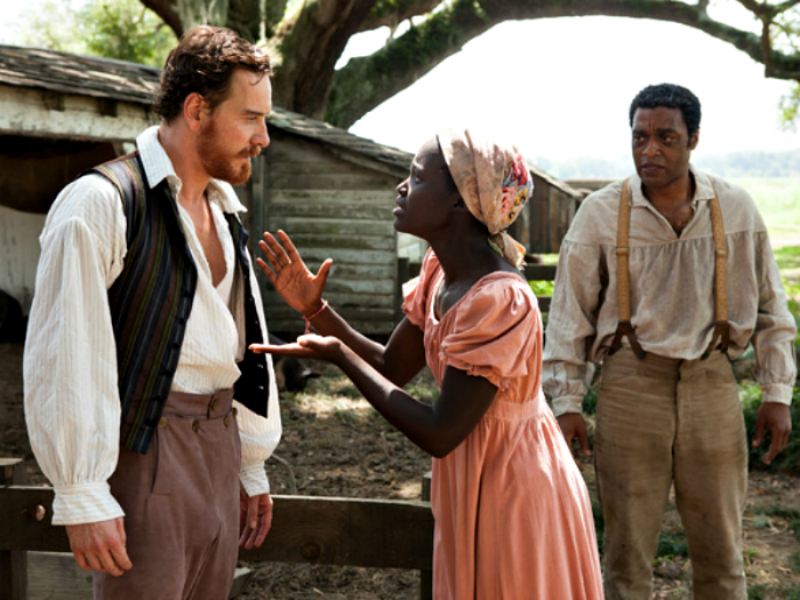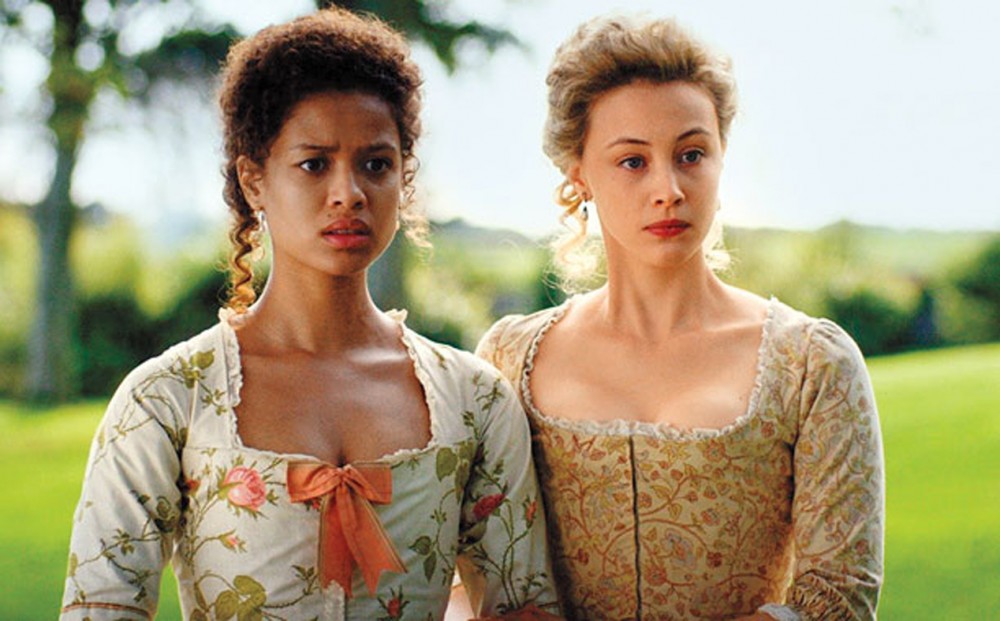A quiet possible contender to heights attained by Mr. Tarantino’s Django Unchained — not that I wish to make predictions — is the upcoming Steve McQueen’s 12 Years a Slave. Written by John Ridley and based on a memoir by Solomon Northup, a free black resident of New York State kidnapped into slavery in the Deep South in 1841.
12 Years is an ambitious undertaking by Mr. McQueen. It is also by far the most audacious of the three features (Hunger and Shame are the others) displaying an impressive blend of radical and conventional movie techniques.
The violence in 12 Years is untamed. Its horror is an unapologetic representation of the historicity of American slavery and a close narrative of the pictures painted by almost all memoirs of many a slave experiences. The honesty and determination of Mr. McQueen to illustrate the far-reaching expanse of the cruelty of American slavery reaches his audiences in a harshly stupefying way.
Giving very little up to even those few audiences who cringe and recoil at the level of atrocities committed in such films – during slavery – Mr. McQueen in his own capacity opines with humbling sincerity the enormity of crimes – the rape, the lynching, the whipping, the dehumanization – committed against Africans in America of the era.
And perhaps even today!
Some critics insist that 12 Years is an exaggeration of the past and an overly emotional exercise coming, understandably, from a black director. They claim that 12 Years only latches onto the simple, stark picture of good and evil although they confess the possibility that it depicts to a large extent what happened to some slaves in some parts of America.
Except, this reading of the film, besides the fact that it lacks any humanity and a true concession of what white leaders did to Africans in America, smells deficient of any insight into the art of storytelling itself. At its very basic interpretation however, their criticism only underscores how much the Trans-Atlantic slave narrative in American History feeds so effortlessly into Mr. McQueen’s interpretation of it.
Some African American critics have also ambushed Mr. McQueen’s direction, angling the argument around the absence of films that hinge on ordinary slaves – the ones who couldn’t read, nor write, nor escape. Others have thrashed 12 Years as a simplistic portrayal of Africans bound in American slavery. They argue that the film fails to show the determination of slaves to fight for their lives and their families, even die while trying, in pushing for their freedom.
The later criticism holds some water, though 12 Years A Slave is not that sort of film. Django Unchained argues that case in many respects. What Mr. McQueen accomplishes here is trace the life of a free man from Saratoga, New York, to the Deep South of white supremacy and black slavery.
12 Years is a dirge, sang in the lasting memory of the many Africans who were born free men and women in their own lands in Africa or Saratoga, but were taken either by force or by will to America or the Deep South and subjected to the most inhumane treatment the world has ever known.
It is one of a few films that clarifies the slave narrative – that these Africans were once free land owning, hardworking, loving men and women before they were snatched from their humble comforts in Africa! And that, this is the worst human rights violation this world has ever known.
Mr. McQueen’s outside eye brings this needed perspective to the American slave narrative. The history of African Americans did not begin with America, it begun in Africa, where their ancestors had always lived many thousands of years before even Europe was born. That Slavery is an accident that happened to African Americans. It won’t happen again!
There are also those films like The Butler and The Help that tow a different slave narrative. Both Mr. Lee Daniels and Mr. Tate Taylor respectively sought a tranquilized approach to portraying American slavery. So far, only Mr. Quentin Tarantino and now Steve McQueen have painted American slavery with the brutality it deserves.
12 Years is a narrative that is as contextual as it is equally, consistently and endearingly perpetual. As much as there was agreement amongst civilized people back in 1841 – both black and white – that slavery was inhumane and undermined our fundamental solidarity as humans, there is in equal measure a fundamental hypocrisy pervasive even in American society today.
The War on Drugs!
The US Attorney General Eric Holder on August 12, could only finally admit that: “Too many Americans [blacks] go to prisons for far too long, and for no truly good law enforcement reason.”
No sensible person in today’s world can justify and even defend the atrocities that this Reagan War on African Americans has committed against black men and black families in America today. The communities lost and the socio-economic wealth development deprived of Black societies in America is the latest inhumanity that African Americans have suffered and still suffer. Alas, to what end?
But white America clearly looks on, continuing in this dehumanization effort against blacks. Those who enact the laws, who enforce them, and who have power to overturn them still stand willfully by, because in its final analysis, like slavery, this practice and the reluctance to stop it – the war on drugs – is not far removed from the socio-economic interest of white America. Isn’t it?
Americans today are no more inhumane as the heartless perpetrators of American slavery yesteryear.
How else can you explain why America has the world largest prison population? China, which has more than four times as many people and nobody’s idea of a lenient judiciary, comes a distant second. One can only conclude that America enjoys imprisoning its black population as much as it did in enslaving them prior to the Abolition.
A black man in America is 3.6 times more likely to be incarcerated than a black man in 1993 in South Africa, just before slavery’s most beloved cousin – apartheid – on African soil itself, ended.
Black people continue to go to prison 18 times longer than a white person, if that white person is even arrested and charged at all, for the same offense? This period in America’s history is equally reminiscent of American slavery’s inhumanity to Africans.
So while the narrative of the horrors of American slavery continue to evolve into one that was only committed by white Americans in the Deep South, Mr. McQueen’s interjection with this wonderful story that is totally innocuous from the begging story-lines of the The Help and Lee Daniels’ The Butler, is timely and adds a considerable touch of genius and comprehension to a history that continues to be distorted and torched as if we lived in a post-racial America.
12 Years is emotionally charged and accessible, and also packed with excellent performances — from Chiwetel Ejiofor in the lead role, from a smattering of well-known screen actors and perhaps most strikingly from a newcomer, Lupita Nyong’o — and likely to extend the discussions about race that have rippled around recent movies like The Help, Django Unchained, Lincoln and Lee Daniels’ The Butler.
Here we are in 2013 and who but a director with Mr. McQueen’s perspective can elucidate our understanding of the past and our comprehension of the present experiences of African Americans in this country. This is a story to watch.











Daité, the cia will be on yo ass if you continue to think like this. LOL.
He’s lucky if they don’t already have his ass… lol.
You mean like Obama, the other black man, and the NSA have his ass???
Oh cry me a bucket about the war on drugs… can’t black people just stop doing drugs then??? Here goes another crying victim, victim, victim. Slavery ended years ago. What has Northup’s memoirs got to do with the war on drugs? Frankly, I see no comparison… Daite, you are reaching here.
To link America’s past, Slavery, with the present, America’s war on drugs – or rather America’s war on black people – is perhaps the purest of true comprehension of the horrors of both era or shall I say the continuing horror of something only Europe has developed and patented – Racism — one humans hatred for another human for absolutely no reason! Great thoughts on McQueen’s work. I am yet to see it but with this review, I will be back to express some more.
Interesting comparisons raised btn Slavery and the war on drugs. I would have committed to a profuse comment but I hold my thoughts for now, at least until I have seen this movie. McQueen is no doubt an evolving director whose work I continue to admire. 12 years of slavery sounds like an enticing memoir.
Hmm… your analyses are strong but you read too strongly into the film, in that, I don’t think this movie by McQueen accomplishes all what you wish it did. On one hand I felt the film felt short and a read of the memoir is a better tale of what transpired in that slaver era in the deep south.
Personally, I hate to see films like this but I look forward to seeing 12 Years A Slave in the theaters this weekend. Judging the film by its cover though, I am sure is a whole lot better than Django Unchained.